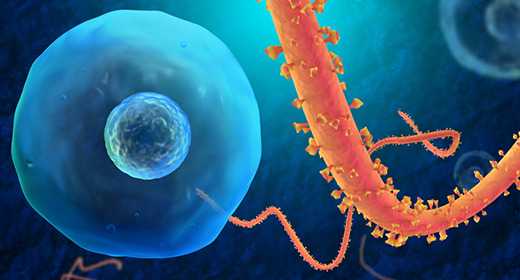
In an August 26 Policy Points video, Carl Simon argues that quarantine is the key to containing and eliminating the recent outbreak of the Ebola virus—the most deadly to date. “The first Ebola outbreak was noted about 40 years ago in small villages,” explains Simon. “It affected small groups, because these villages were very isolated. Now the world has gotten smaller, villages are more interconnected. Diseases get around more easily.”
"To beat Ebola is a difficult but straightforward process," says Simon. The process? Quarantine. With quarantine procedures in place, Simon is tentatively confident that this outbreak of Ebola can be contained and eliminated by the end of the year.
A few days after this Policy Points video was recorded, the President of Liberia ordered the quarantine of the West Point community Simon mentions. West Point residents, perhaps frightened by the World Health Organization’s decision to use a local school building as an Ebola treatment center, had broken into the building and taken with them equipment, including sheets with the blood of Ebola victims. Those sheets could transmit Ebola, says Simon. “But it’s probably different if you touch the blood of an infected person, or touch the sheet with dried blood. Even in the U.S., childhood infections can be transmitted by playing with toys in a day care program. There’s a name for inanimate objects that can serve as vectors for infectious diseases—fomites."
“The problem with Ebola is that the symptoms at the beginning are not too uncommon—fever, fatigue—they could be masking Ebola, or a cold or flu or malaria. It’s difficult to know. But because the infection spreads so easily, and is so deadly, we can’t take chances,” says Simon. One factor in our favor: unlike some other deadly viral infections, an Ebola-infected person is most contagious when symptoms are present.
Simon recognizes that quarantine is a scary thing, a heavy-handed process. “We’re stomping on individual rights for the public good, walling off an entire town.” But for all that, quarantine isn’t uncommon, he explains. Many hospitals quarantine new patients who might have drug-resistant staph infection. We used quarantine very effectively to stop the spread of SARS. “The burning question everyone’s asking,” he says, “is whether or not Ebola is going to impact the U.S.” Simon’s answer? “Almost certainly not, because we know how to quarantine. But hopefully, we also give a lot of care and attention to those inside the wall.”
Carl Simon, a professor of mathematics, economics, complex systems and public policy, is director of the Science, Technology, and Public Policy Program at the Ford School. His research focuses on ecosystems responding to human interactions and to the dynamics of spread of contagious diseases. Simon is winner of the Howard M. Temin Award for "scientific excellence in the fight against HIV/AIDS."
Policy Points is a video series featuring short segments on current events or recent research by faculty from the Gerald R. Ford School of Public Policy. We encourage opinion leaders worldwide to use material from these videos or transcripts in decision making, research, or media-related activities, and to contact us for more information. Please give credit to “Gerald R. Ford School of Public Policy, University of Michigan, fordschool.umich.edu."
See more Policy Points videos at: /policypoints/
More news from the Ford School